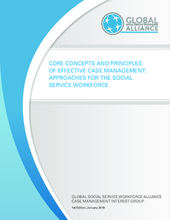Developed by members of the Global Social Service Workforce Alliance’s Case Management Interest Group, this resource aims to define case management. It provides key steps and other important considerations for strengthening the ability of the social service workforce to effectively carry out case management throughout all steps of the process.
The use of quality case management practices has been shown to improve decision-making and service delivery in child welfare and protection that reduces violence against children, prevents unnecessary family separation, and improves child and family outcomes. In recent years, many organizations have been working on the development of case management standard operating procedures (SOPs), training materials and program guides. These are intended to strengthen the ability of the social service workforce to carry out effective case management practices. Although a lot of information about case management is currently available, members of the Global Social Service Workforce Alliance (hereinafter referred to as ‘the Alliance’) suggested a concise description of the concept of case management and the basic ideas or rules that explain, outline or provide guidance on how case management is used and the role of the social service workforce.
The aim of this document is to support the social service workers responsible for implementing a case management process, by articulating the main principles and concepts of case management. It includes foundational definitions and descriptions of the basic components or steps of a case management process. This paper is not meant to be prescriptive, but rather to serve as a guide to help inform or reflect upon local and contextualized approaches. It is the hope of the Global Social Service Workforce Alliance that the information provided herein can help to inform case management practices and processes at all levels including community as well as statutory processes as implemented by professional and para professional social service workers.
The case management process described herein can be applied by a range of social service providers in both development and humanitarian settings and across different client groups, organizations, contexts and countries. Throughout the document, links are provided to more detailed tools and resources that can be applied during different points within the case management process. The term ‘social service worker’ is used throughout this document to refer to both professional and para professional social service practitioners.

